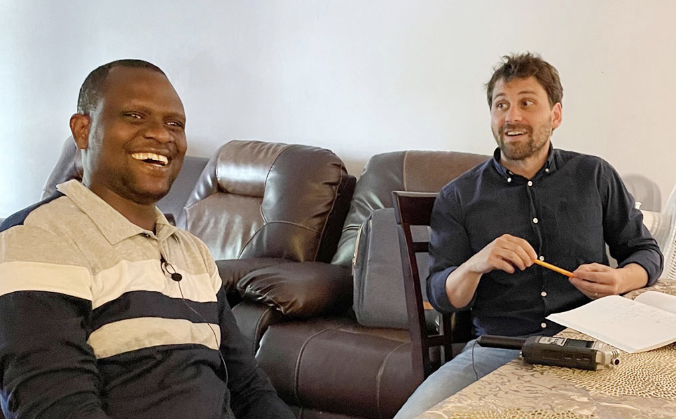

A grant from the National Science Foundation will enable a professor to work with Congolese refugees in the Kansas City area on a project he hopes will elucidate certain Bantu language features while bolstering KU’s status as a hub for both African and linguistic studies.
John Gluckman, University of Kansas assistant professor of linguistics, has been awarded $320,000 for a project that “expands the general understanding of sentences within sentences by focusing on variation within the Bantu languages, primarily within the subfamily of Bantu languages spoken around the Great Lakes in East Africa.” The project will examine particularly the role of “complementizers,” or words that serve to connect clauses in sentences within sentences. He used the example of the word that in the sentence “Wekesa thinks that Masika left” for the grant. Bantu is a family of more than 600 languages spoken throughout Central, Southern, and East Africa.
With the funds, Gluckman intends to hire one or more African linguists to come over during the three-year project to provide their native-speaking expertise while learning the latest in linguistic techniques and theories at KU.
“Most of the grant money is going to bringing in African students to train here at KU,” Gluckman said. “One of the things we’re worried about in the linguistics community is that there’s not enough diversity of representation. Most of the people who do linguistic work are like me—White men and nonnative speakers. So we’re trying to make this a more accessible, open environment, getting native-speaker linguists into the conversations, getting them to have voices, giving them the training that they can then take home and start documenting the languages around them.”
Gluckman speaks passable Kiswahili, which is one of the Bantu languages and a lingua franca of the eastern African region being studied. He will also work with members of the Congolese refugee community in Greater Kansas City.
“Linguists recognize that it’s very important to document these communities and their languages, which are not as endangered as some other languages, but they’re definitely in danger of dying out within a few generations,” Gluckman said.
And while preserving the languages is not the grant’s primary focus, Gluckman said the project will help with that goal, too, by developing “narrative resources” that succeeding generations in the Bantu diaspora can use.
“We’re going to make stories that we’re going to put online—monolingual stories, because a lot of these languages are not known in the diaspora communities; they’re not really being spoken so much in America. People are defaulting to English, Swahili, Kinyarwanda… So we’re going to try to record a lot of these languages and get them online so that kids can start reading things in their native language.”
Gluckman is pleased that his project will add to the study of African topics on the Lawrence campus.
“We already have access here to the Kansas African Studies Center, which is a huge hub for African resources. We have the Department of African and African American Studies here, which is amazing. So I want this community also to feel like they have a connection here as well. We’re trying to build this up.”
Image: John Gluckman (right) met with Kinyamulenge speaker Justin Ngirabakunzi in the Kansas City area as part of a new grant-funded program. Credit: Aron Finholt.







